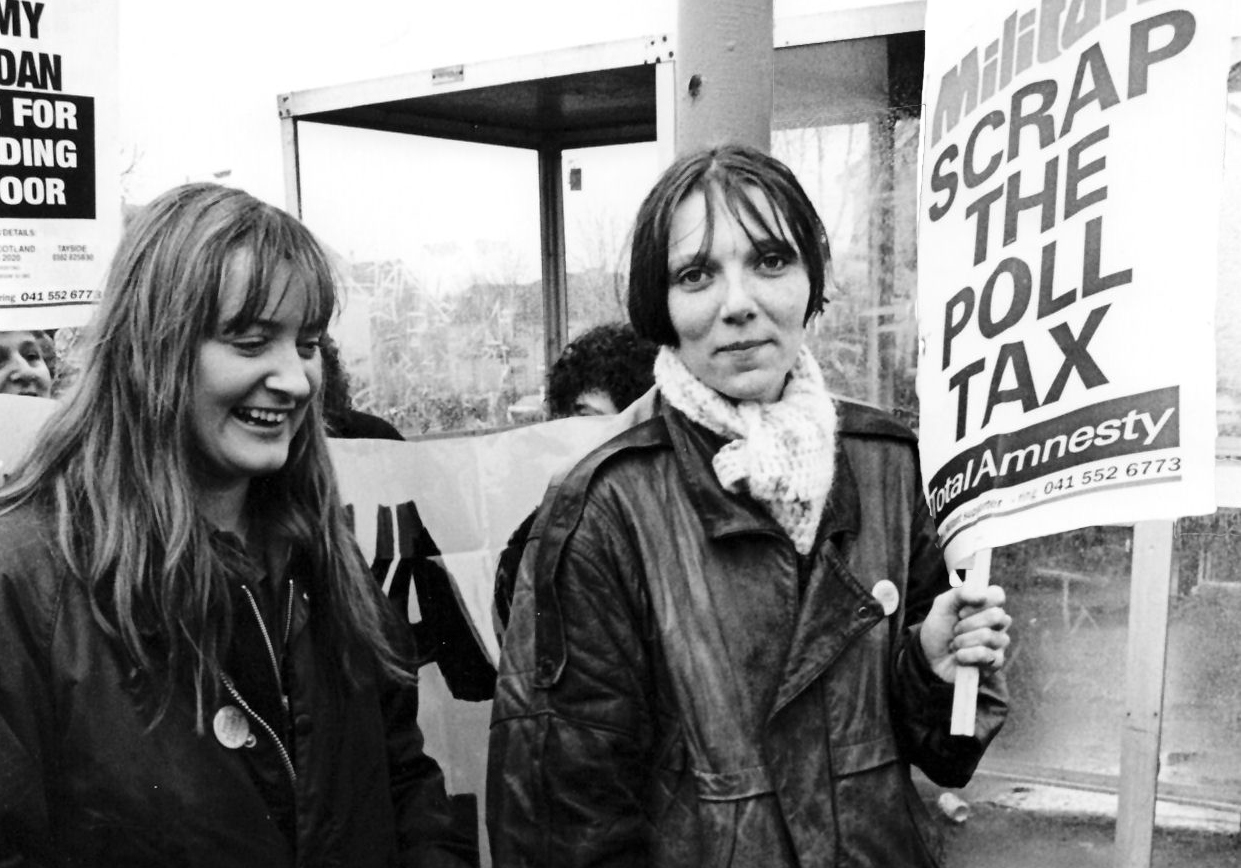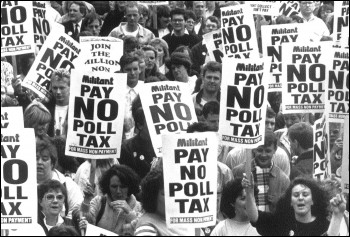BBC radio review: Poll Tax
The Reunion rewrites history
Naomi Byron
BBC Radio 4’s The Reunion recently had a programme on the anti-poll tax movement of the late-1980s and early 1990s, Britain’s biggest mass movement of civil disobedience for centuries.
Bizarrely, the programme’s makers did not even invite anyone from Militant (now the Socialist Party), the organisation whose tactics and strategy defeated the poll tax and Thatcher. Tory poll tax exponent Lord Baker was there but not us – it was like discussing public service broadcasting with representatives from the Murdoch media empire and a few journalists from privately owned newspapers.
Virtually every mention of Militant attacked our role with no right to reply. Danny Byrne from Bristol was active in the All-Britain Anti-Poll Tax Federation but his main qualification for being on the programme seemed to be that he was not a member of Militant. He said that Militant played a good role in the beginning, but as the campaign grew we just wanted to control it, and it only succeeded because people like him helped build such a campaign that we couldn’t.
The programme makers could only rewrite history so outrageously because we were excluded.
The truth
In fact it was the strategy and tactics developed by Militant of mass non-payment (involving 14 million non-payers), clogging up the courts, as we campaigned for mass turnouts of people summonsed for non-payment, and legal challenges at every stage. This made the poll tax unworkable and forced Thatcher out of power.
This strategy could only be developed because of the close connections Militant had developed over decades with the labour movement and working class communities. Our approach was designed to mobilise the largest number of people to defeat the poll-tax, while explaining, in an accessible way, the need for socialist change.
There were many heroic class fighters who agreed with Militant over the main tactics needed to defeat the tax, though they disagreed with us on socialism. But without Militant’s clear lead on strategy, and our branches up and down the country which could turn as one to prepare for the next stage of the battle, the poll tax campaign would have been much smaller, weaker and more divided. It certainly would not have won the rapid, clear victories it did.
Many more people could have been jailed; thousands could have had their goods seized by the bailiffs or poinded (seized) by the sheriff officers (the equivalent of bailiffs in Scotland) and Thatcher would have stayed in power longer. Rather than wanting to control the campaign, Militant led the drive to involve fully as many non-payers as possible at all levels.
The programme ended with a few sentences about the relevance of the anti-poll tax movement to the mass campaigns against the cuts which are developing today, which was welcome.
But there could have been so many more points made about the Con-Dems’ long history of vicious attacks on public services and local democracy, and how mass opposition to the cuts could develop today.
Liverpool in the 1980s
‘Lord’ Baker openly stated that the poll tax was introduced to ‘clip the wings’ of local government, and that the first time the Cabinet discussed the poll tax was on 9 January 1986, during the months of the great slander against the Militant in Liverpool.
Militant, although a minority on the left Labour council in Liverpool, had led a successful mass campaign to demand money for local services back from central government.
Popular, and re-elected with bigger votes in each election, the Labour left in Liverpool had done what they were elected to do and refused to make cuts, instead building around 5,000 new council homes and creating 2,000 more jobs.
Like today, most Labour councils wrung their hands and then got on with doing the government’s dirty work by slashing services.
The Tories’ answer to Liverpool’s heroic struggle was to undemocratically remove the 47 left Labour councillors in Liverpool, including many supporters of the Militant, and secretly begin planning for the poll tax.
This only underlines the point that Militant, and now the Socialist Party, makes in every campaign, that although it is possible to defeat one or other policy of the government or the bosses, they will always come back for more.
That is why we need to campaign not only to defeat the cuts, but also to remove the power of big business by taking the key sections of the economy into public hands and running them under democratic workers’ control.
Only a workers’ government, run along socialist lines, will act in the interests of ordinary people.
Today Socialist Party members are playing a key role in putting pressure on the trade union leaders to organise a serious campaign to defeat cuts, beginning with naming the day for a general strike, as well as the project of building a new party for working people.
We are presently helping to build the Trade Unionist and Socialist Coalition (TUSC) which is preparing to stand anti-cuts candidates up and down the country in the next elections.
If you want to know how the anti-poll tax battle was won, and lessons for today’s anti-cuts battle, come to our meetings and discussions, such as Socialism 2012. Sadly the BBC seems less than keen to shed any real light on the matter.











